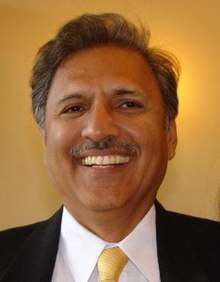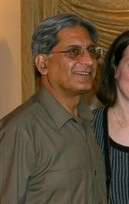Pakistani presidential election, 2018
|
| |||||||||||||||||||||||||||||
| |||||||||||||||||||||||||||||
679 votes in the Electoral College[n 1] - Plurality needed to win | |||||||||||||||||||||||||||||
|---|---|---|---|---|---|---|---|---|---|---|---|---|---|---|---|---|---|---|---|---|---|---|---|---|---|---|---|---|---|
| |||||||||||||||||||||||||||||
 | |||||||||||||||||||||||||||||
| |||||||||||||||||||||||||||||
 |
|---|
| This article is part of a series on the politics and government of Pakistan |
|
|
|
Executive:
|
|
|
|
Presidential elections (Urdu: صدارتی انتخابات) were held in Pakistan on 4 September 2018.[2]
Incumbent President Mamnoon Hussain of the Pakistan Muslim League (N) (PML-N) party was eligible for re-election to a second 5-year term, but declined. His current term will end on 9 September 2018. General elections were held in Pakistan on 25 July 2018 to elect members of the National Assembly.[3][4] The newly elected assemblies elected a new President.
On 4 September 2018, Arif Alvi was elected as 13th President of Pakistan.[5]
Schedule
The Election Commission of Pakistan announced the initial election schedule on 16 August 2018. Polling was conducted on following five places on 4 September 2018:
- Parliament House at Islamabad
- Punjab Provincial Assembly at Lahore
- Sindh Provincial Assembly at Karachi
- KPK Provincial Assembly at Peshawar
- Baluchistan Provincial Assembly at Quetta
Members of Senate and National Assembly casted their vote at Parliament House whereas members of Provincial Assemblies casted their vote at respective assemblies.
Electoral system
The President of Pakistan is indirectly elected by the Electoral College of Pakistan – a joint sitting of the Senate, National Assembly and Provincial Assemblies.
The votes of the members of the Senate and National Assembly are counted as single votes. Meanwhile, the votes given by the provincial assembly legislators are adjusted so as to give each province an equal share in the election. This is so because, each provincial assembly has a varying number of members, depending upon population size. The largest province by population size, Punjab, has a total of 371 members in its assembly, whereas the smallest province of Balochistan has a mere 65 members in its legislature. Therefore the provincial votes are weighted against the Balochistan assembly in the following manner:[1]
| Provincial Assembly | Members | Weightage of each vote | Total votes |
|---|---|---|---|
| Balochistan | 65 | 1 | 65 |
| Khyber-Pakhtunkhwa | 124 | 0.524 | 65 |
| Punjab | 371 | 0.175 | 65 |
| Sindh | 168 | 0.387 | 65 |
Regarding timing, the constitution states that election to the office of President must be held no earlier than sixty days and no later than thirty days before the expiration of the term of the incumbent president. If assemblies are not present, the constitution allows the election of president to be delayed thirty days after the general election.[6]
The electoral process itself is done via a secret ballot due to the post of the president being constitutionally non-partisan. Therefore, unlike during the election of the Prime Minister, cross-party voting is not liable to be considered defection.[1]
Electoral College
The Electoral College of Pakistan is formed by a joint sitting of the six leading political bodies in Pakistan:
- the Senate of Pakistan,
- the National Assembly of Pakistan,
- the Provincial Assembly of the Punjab,
- the Provincial Assembly of Sindh,
- the Provincial Assembly of Balochistan and
- the Provincial Assembly of Khyber Paktunkhwa
The maximum strength of the electoral college is 706. However, considering the vacant seats, the electoral college for this presidential election stood at 679. A simple majority is required in a two-candidate contest to claim victory. But in a three-candidate race, the victory requirement goes down considerably depending on how the votes are split.[1]
The weighted votes of each political party in the six bodies constituting the electoral college are as follows:[1]
| Body | PTI | PML-N | PPP | MQM | MMA | PML | BAP | GDA | IND | BNP(M) | ANP | BNP(A) | AML | HDP | PKMAP | TLP | JWP | NP |
|---|---|---|---|---|---|---|---|---|---|---|---|---|---|---|---|---|---|---|
| National Assembly[7] | 151 | 81 | 54 | 7 | 15 | 3 | 5 | 3 | 4 | 4 | 1 | 0 | 1 | 0 | 0 | 0 | 1 | 0 |
| Senate[8] | 12 | 31 | 20 | 5 | 6 | 0 | 7 | 1 | 15 | 1 | 1 | 0 | 0 | 0 | 5 | 0 | 0 | 5 |
| Punjab Assembly | 30 | 28 | 1 | 0 | 0 | 2 | 0 | 0 | 1 | 0 | 0 | 0 | 0 | 0 | 0 | 0 | 0 | 0 |
| Sindh Assembly | 12 | 0 | 38 | 8 | 0 | 0 | 0 | 5 | 0 | 0 | 0 | 0 | 0 | 0 | 0 | 1 | 0 | 0 |
| Balochistan Assembly | 6 | 1 | 0 | 0 | 12 | 0 | 23 | 0 | 4 | 9 | 4 | 3 | 0 | 1 | 1 | 0 | 1 | 0 |
| KPK Assembly | 40 | 3 | 3 | 0 | 7 | 1 | 0 | 0 | 2 | 0 | 4 | 0 | 0 | 0 | 0 | 0 | 0 | 0 |
| Total (weighted) | 251 | 144 | 116 | 33 | 40 | 6 | 28 | 9 | 22 | 14 | 10 | 3 | 1 | 1 | 6 | 1 | 2 | 5 |
Results
Summary of the 4 September 2018 Pakistani presidential election results[9][10]
| Candidate | Main supporting party | Parliament | Punjab | Sindh | Balochistan | KP | Total |
|---|---|---|---|---|---|---|---|
| Arif Alvi | Pakistan Tehreek-e-Insaf | 212 | 33 | 22 | 45 | 40 | 352 |
| Fazal-ur-Rehman | Pakistan Muslim League (N) | 131 | 25 | 0 | 15 | 13 | 184 |
| Aitzaz Ahsan | Pakistan Peoples Party | 81 | 1 | 39 | 0 | 3 | 124 |
Candidates
Confirmed
- Arif Alvi: Pakistan Tehreek-e-Insaf member of the National Assembly from NA-247 (Karachi South-II). Nominated by Prime Minister Imran Khan on 18 August 2018.[11]
- Aitzaz Ahsan: Pakistan Peoples Party former member of the Senate from Punjab. Nominated by Asif Ali Zardari on 19 August 2018.[12]
- Fazal-ur-Rehman: Joint Candidate of Muttahida Majlis-e-Amal, Pakistan Muslim League (N) and various other opposition parties. Nominated by Shahbaz Sharif on 27 August 2018.[13]
Withdrawn
- Amir Muqam: President of Pakistan Muslim League (N) in Khyber Pakhtunkhwa and former MNA. Withdrew his nomination papers following the joint nomination of Fazal-ur-Rehman.[14]
Notes
References
- 1 2 3 4 5 Mehdi, Tahir (2018-09-02). "Analysis: PTI poised to take President House". Dawn. Retrieved 2018-09-03.
- ↑ "Presidential elections to be held on September 4". Dunya News. 16 August 2018.
- ↑ "General polls 2018 would be held on July 25: sources". Dunya News. 22 May 2018.
- ↑ Samaa Web Desk. "Govt to complete its term; elections to be held in July 2018: PM".
- ↑ "Arif Alvi elected 13th president of Pakistan | The Express Tribune". The Express Tribune. 4 September 2018. Retrieved 4 September 2018.
- ↑ "Second Schedule: Election of President". Pakistani.org. Retrieved 2018-08-29.
- ↑ National Assembly of Pakistan
- ↑ "Senate of Pakistan". Senate.gov.pk. Retrieved 30 July 2013.
- ↑ "PTI's Dr Arif Alvi elected 13th President of Pakistan". Dawn. 4 September 2018.
- ↑
- ↑ "PM Imran has nominated Arif Alvi for President of Pakistan: Chaudhry". Geo.tv. 2018-08-18. Retrieved 2018-08-22.
- ↑ "PPP nominates Aitzaz Ahsan as its presidential candidate: sources | Pakistan". Geo.tv. 2018-08-18. Retrieved 2018-08-22.
- ↑ "Opposition except PPP decide to field Maulana Fazl for president: sources: AtifChaudhry". Geo.tv. 2018-08-18. Retrieved 2018-08-22.
- ↑ Chaudhry, Fahad (30 August 2018). "PML-N's Muqam opts out of presidential race as deadline to withdraw nomination papers ends".

.png)
